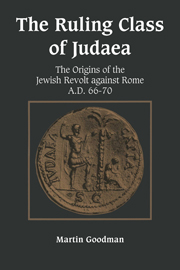Book contents
- Frontmatter
- Contents
- Abbreviations
- Preface
- Maps
- 1 Introduction
- PART I THE RULING CLASS A.D. 6–66
- PART II FACTION STRUGGLE WITHIN THE RULING CLASS
- 6 Reactions to failure: the ruling class a.d. 6–66
- 7 The outbreak of revolt
- 8 The independent Jewish state a.d. 67–70
- 9 Trends in faction politics a.d. 50–70
- PART III THE AFTERMATH OF THE REVOLT
- Select bibliography
- Index
6 - Reactions to failure: the ruling class a.d. 6–66
Published online by Cambridge University Press: 01 June 2011
- Frontmatter
- Contents
- Abbreviations
- Preface
- Maps
- 1 Introduction
- PART I THE RULING CLASS A.D. 6–66
- PART II FACTION STRUGGLE WITHIN THE RULING CLASS
- 6 Reactions to failure: the ruling class a.d. 6–66
- 7 The outbreak of revolt
- 8 The independent Jewish state a.d. 67–70
- 9 Trends in faction politics a.d. 50–70
- PART III THE AFTERMATH OF THE REVOLT
- Select bibliography
- Index
Summary
How was the ruling class to react as their inability to win authority over Judaea became gradually more apparent? They could hardly opt out of the invidious position into which they had been placed by Rome, except perhaps by the last resort of emigration, which was indeed quite probably the eventual fate of some of them (cf. B.J. 2.279). Rome needed local rulers and insisted that the rich took on that role. They had little choice.
Some of the ruling class presumably accepted their lot and soldiered on with blind disregard of the disorder in the countryside and among their poorer compatriots. Disorder and brigandage will have affected them directly only rarely. In the luxury of their homes they could ignore the problems of the peasants. Josephus even writes once, astonishingly, that four years before the revolt the city of Jerusalem was enjoying exceptional peace and prosperity (B. J. 6.300).
The rich themselves were not threatened by the social disorder. No class leaders had come forward to demand social justice on behalf of the oppressed (see above, p. 67). There were occasional charismatic figures who challenged their right to rule, but they won few supporters and were easily dealt with by the Roman governor (see above, p. 92).
- Type
- Chapter
- Information
- The Ruling Class of JudaeaThe Origins of the Jewish Revolt against Rome, A.D. 66–70, pp. 137 - 151Publisher: Cambridge University PressPrint publication year: 1987



